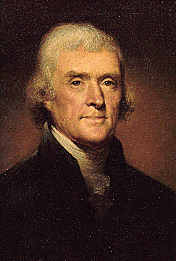
Turn Up Your Speakers
These Pages are High in Graphics
Please be patient as they load.
Independence
Day ~ America’s Birthday

“Whenever
any form of government becomes destructive of these ends
(life, liberty and the pursuit of happiness),
it is the
right of the people to alter or abolish it,
and to
institute new government.”
Thomas Jefferson (1743-1826)
from the Declaration
of Independence
Schoolchildren in America learn the basic history of the events
surrounding the Fourth of July, but the details of this monumental
occasion in American history somehow fall through the cracks.
Independence
Day is the national holiday of the United States of America commemorating
the signing of the Declaration of Independence by the Continental Congress
on July 4, 1776, in Philadelphia, Pennsylvania.
At the time of the signing the US consisted of 13 colonies under the rule of England's King George III. There was growing unrest in the colonies concerning the taxes that had to be paid to England. This was commonly referred to as "Taxation without Representation" as the colonists did not have any representation in the English Parliament and had no say in what went on. As the unrest grew in the colonies, King George sent extra troops to help control any rebellion. In 1774 the 13 colonies sent delegates to Philadelphia Pennsylvania to form the First Continental Congress. The delegates were unhappy with England, but were not yet ready to declare war.
The following May the colonies again sent delegates to the Second Continental Congress. For almost a year the congress tried to work out its differences with England, again without formally declaring war.
 By
June 1776 their efforts had become hopeless and a committee was formed to
compose a formal declaration of independence. Headed by Thomas Jefferson,
the committee included John Adams, Benjamin Franklin, Philip Livingston
and Roger Sherman. Thomas Jefferson was chosen to write the first draft
which was presented to the congress on June 28. After various changes a
vote was taken late in the afternoon of July 4th. Of the 13 colonies, 9
voted in favor of the Declaration, 2 - Pennsylvania and South Carolina
voted No and Delaware remained undecided. All of this had occurred with some of the delegates to the Congress not
even present; New York, for example, did not even vote on the resolution
until July 9th.
By
June 1776 their efforts had become hopeless and a committee was formed to
compose a formal declaration of independence. Headed by Thomas Jefferson,
the committee included John Adams, Benjamin Franklin, Philip Livingston
and Roger Sherman. Thomas Jefferson was chosen to write the first draft
which was presented to the congress on June 28. After various changes a
vote was taken late in the afternoon of July 4th. Of the 13 colonies, 9
voted in favor of the Declaration, 2 - Pennsylvania and South Carolina
voted No and Delaware remained undecided. All of this had occurred with some of the delegates to the Congress not
even present; New York, for example, did not even vote on the resolution
until July 9th.
Even more interesting is the fact that not a single signature was appended
to the Declaration on July 4th. While most of the fifty-six names were in
place by early August, one signer, Thomas McKean, did not actually sign
the Declaration until 1781.
On July 5th copies of the Declaration were distributed. The first
newspaper to print the Declaration was the Pennsylvania Evening Post on
July 6, 1776. On July 8th the Declaration had its first public reading in
Philadelphia's Independence Square. Twice that day the Declaration was
read to cheering crowds and pealing church bells. Even the bell in
Independence Hall was rung. The "Province Bell" would later be
renamed "Liberty Bell" after its
new inscription,
Proclaim Liberty Throughout All the Land Unto All the Inhabitants Thereof
Nevertheless, July 4th was the day singled out to mark the event of the United States establishing itself as a nation.
Only four
American holidays are still celebrated on their proper calendar days:
Halloween, Christmas, New Year’s and Independence Day. Of all the
secular holidays, the Fourth of July is the only one whose celebration
date resists change. Even in more provincial times, suggestions to alter
the day of the festival to the preceding Saturday or the following Monday
when July 4th fell on Sunday were protested.
The feeling about the sanctity of America’s Independence day was best
expressed in a quotation from the Virginia Gazette on July 18th, 1777:
“Thus may the 4th of July, that glorious and ever memorable day, be
celebrated through America, by the sons of freedom, from age to age till
time shall be no more. Amen and Amen.”
In Association with Amazon
For More Patriotic Titles Click Here
Copyright ©Emotions Greeting Cards a division of VH Productions 2000-2002